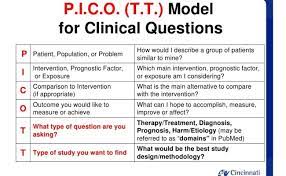Formulating a PICOT question 2022 Best

This assignment focuses on Formulating a PICOT question for a specific care issue and evaluate the evidence you locate, which could help to answer the question.
Formulating a PICOT question
Developing a PICO(T) question for a specific care issue.. Create a 3-5-page submission in which you develop a PICO(T) question for a specific care issue and evaluate the evidence you locate, which could help to answer the question. PICO(T) is an acronym that helps researchers and practitioners define aspects of a potential study or investigation. It stands for: P – Patient/population/problem. I – Intervention. C – Comparison (of potential interventions, typically). O – Outcome(s). T – Time frame (if time frame is relevant). The end goal of applying PICO(T) is to develop a question that can help guide the search for evidence (Boswell Cannon, 2015).
Formulating a PICOT question
From this perspective, a PICO(T) question can be a valuable starting point for nurses who are starting to apply an evidence-based model or EBPs. By taking the time to precisely define the areas in which the nurse will be looking for evidence, searches become more efficient and effective. Essentially, by precisely defining the types of evidence within specific areas, the nurse will be more likely to discover relevant and useful evidence during their search. You are encouraged to complete the Vila Health PCI(T) Process activity before you develop the plan proposal. This activity offers an opportunity to practice working through creating a PICO(T) question within the context of an issue at a Vila Health facility.
Formulating a PICOT question
These skills will be necessary to complete Assessment 3 successfully. This is for your own practice and self-assessment and demonstrates your engagement in the course. Demonstration of Proficiency By successfully completing this assessment, you will demonstrate your proficiency in the course competencies through the following assessment scoring guide criteria: Competency 1: Interpret findings from scholarly quantitative, qualitative, and outcomes research articles and studies. Explain the findings from articles or other sources of evidence. Competency 2: Analyze the relevance and potential effectiveness of evidence when making a decision.
Formulating a PICOT question
Identify sources of evidence that could be potentially effective in answering a PICO(T) question. Explain the relevance of the findings from chosen sources of evidence to making decision related to a PICO(T) question. Competency 3: Apply an evidence-based practice model to address a practice issue. Define a practice issue to be explored via a PICO(T) approach. Competency 5: Apply professional, scholarly communication strategies to lead practice changes based on evidence. Communicate using writing that is clear, logical, and professional with correct grammar and spelling using current APA style. Reference Boswell, C., Cannon, S. (2015). https://youtu.be/LVR6g8sK9eY
Additional Files







